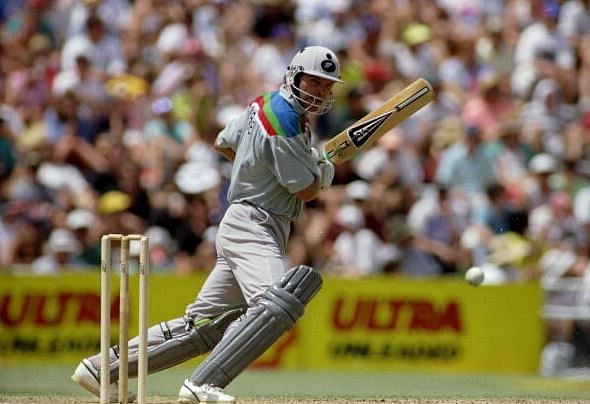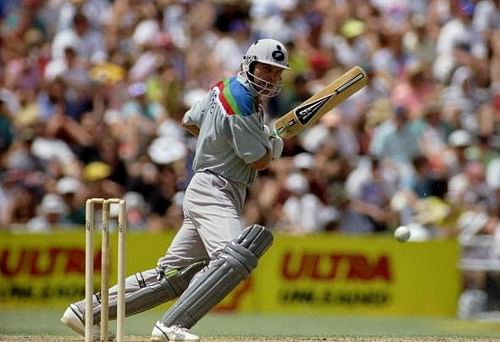
Team history at Cricket World Cup - New Zealand (1975-2011)

The 1992 World Cup is etched in my memory for a number of reasons. It was the first to have coloured jerseys, white balls and floodlit stadiums. For a sleepy 10-year-old, whose cognitive capabilities in cricket, stretching back a couple of years at most, were used to crispy white shirts and sunny afternoons, this was surreal.
The basic rules of cricket were well entrenched in my mind – the batsmen got off to slow starts, conserved their wickets, and had an almighty slog during the final 10 overs, appropriately termed slog overs.
The Kapil Devs and the Wasim Akrams of the world always opened the bowling, while slower bowlers (an unnecessary addition to the sport, in my young opinion, when compared to the awesomeness of the quicker dudes) came on later to fill some overs in between, before the pacers returned to stop the batsmen during the slog.
Imagine my plight, when most of these sacrosanct beliefs were shattered, as I witnessed opening batsmen slogging and a spinner coming in to open the innings. Like a dutiful hero-worshiping son, still a couple of years short of when the customary insanity takes over, I turned to my dad for guidance, but he seemed equally clueless, to begin with.
As I look back now, the mysterious events were just part of the New Zealand team having their best-ever World Cup, spurred by the innovativeness of one of the shrewdest captains to have graced the shorter format – Martin Crowe..
|
Overall Stats |
Played – 70, Won – 40, Lost – 29, No Result – 1 |
|---|---|
|
Trophies Won |
0 |
|
Favourite Opposition among Test-playing nations (Win %) |
Zimbabwe (100%), Bangladesh (100%), South Africa (66.66%) |
|
Least Favourite Opposition among Test-playing nations (Win %) |
Australia (25%), Pakistan (25%), Sri Lanka (33.33%) |
|
Most runs |
Stephen Fleming (1075 runs) |
|
Most wickets |
Jacob Oram (36 wickets) |
|
Most successful captain |
By Win %: Martin Crowe (78%) By Number of Wins: Stephen Fleming (16 wins) |
Most Memorable Performance (1992)
Crowe almost single-handedly turned the game on its head by perfecting the concept of pinch-hitting to take advantage of the newly introduced rule of having only two fielders outside the 30-yard circle during the first 15 overs. He also quickly figured out that the only way to protect his own bowlers from a similar onslaught was to take as much pace off the ball as possible. Hence, the never-before-seen visuals of Dipak Patel sauntering up to the wicket to deliver his off-breaks, and, a couple of matches later, Mark Greatbatch announcing his arrival in one of the most lop-sided matches between top teams in World Cup history.
The remaining cast was equally impressive – the military medium quartet of Willie Watson, Rod Latham, Gavin Larsen and Chris Harris gave absolutely no pace to work with and choked batsmen consistently through the tournament.
When the Blackcaps stopped their more illustrious neighbours 37 runs short of the target in the tournament opener, it may have been considered a flash in the pan performance. Sri Lanka were not yet considered a force to reckon with, and a 6-wicket victory over them was expected.
However, it was their third encounter, against a talented South African team, that forced the world to sit up and take notice. After the dibbly-dobblers restricted the Proteas to 190, pinch-hitters Greatbatch and Rod Latham got them off to a rollicking start, going at run-a-ball as the 100 was raised in no time. The target was achieved in 34.3 overs, and New Zealand had announced themselves as one of the favourites for the Cup.
The Kiwis continued their glorious run, getting past West Indies, India and England without being stretched. Greatbatch was startlingly consistent, getting the team off to blazing starts in every match. Crowe was in the form of his life, and he found an able ally in Andrew Jones, together forging one of the best middle-order alliances in the competition. The Kiwi skipper was to finish the tournament as the highest scorer with 456 runs at an average of 114 and strike-rate of 91.
In their final league match against Pakistan, the New Zealand batsmen were blown away by Wasim Akram, who was probably at the peak of his abilities. Greatbatch yet again made a quick 40, but none of the other batsmen contributed as their innings folded for 166. The bowlers tried their best, but Rameez Raja’s unbeaten 119 inflicted the tournament’s first defeat on the Kiwis, ejecting Australia from the competition, and setting up a semi-final rematch against the ‘cornered tiger’ Pakistan.
In the knockout, the Blackcaps got off to one of their worst starts in the tournament, with Greatbatch suffering a rare failure and Latham and Jones falling for not many. Crowe, magnificent as usual, steadied the ship with an 83-ball 91 and with able support from Ken Rutherford, and some lusty hitting from the middle-order, propelled the score to a very respectable 262.
It was a total the Kiwis were expected to defend. After all, no team had come close to scoring that many against them in the tournament. The script played out in predictable fashion for about 70% of the Pakistan innings. The bowlers maintained their stranglehold, Imran’s self-promotion to number 3 seemed to have misfired, and 123 runs were required off the final 15 overs; next to impossible in the pre-T20 era.
That is when a young Inzamam-ul-Haq, in the words of ESPN Cricinfo writer Sriram Veera, ‘chose to script a fantasy’. The burly right-hander slammed a 37-ball 60, and with Javed Miandad for company, put on 87 runs in 10 overs. The Kiwis, without the services of their enigmatic skipper who was off the field due to a hamstring injury, were shocked into submission.
Though Inzamam was run-out, not surprisingly, with Pakistan still 36 runs away from the target, he had already administered the knockout punch, as Javed and Moin Khan completed the formalities to expel the Kiwis from a tournament they practically owned.
The disappointment still hurts, but not before, and not hence, had the Blackcaps, led by their skipper, exuded such unbridled charisma over the World Cup, one which ended in heartbreak, but made them immortal in the hearts of millions of cricket fans the world over.
Team History
The Kiwis’ most memorable World Cup was preceded by a decade of disappointment and a couple of solid performances in the 70s.
The Kiwis reached the semi-finals in 1975 and 1979, finishing second in the league stage on both occasions, to be ousted by powerful West Indian and English teams, respectively, in the knockout round. To their credit, a much stiffer fight was put up against England in 1979, where the Kiwis, chasing 221, brought it down to the last over, with 14 runs required. More often achieved than not in the post-T20 era, it was perhaps too tall an order 35 years ago, as the Blackcaps fell 9 runs short.
In 1983, the Kiwis started out with a huge defeat at the hands of England, before getting past Pakistan and Sri Lanka with ease. The second encounter with England culminated in one of the best finishes of the tournament, with the Kiwis edging home by 2 wickets with 1 ball to spare. The spectacular effort probably drained the team of their physical and mental reserves, as they slumped to unexpected defeats against both the sub-continent nations in the second-leg encounter, and could not qualify for the semi-finals.